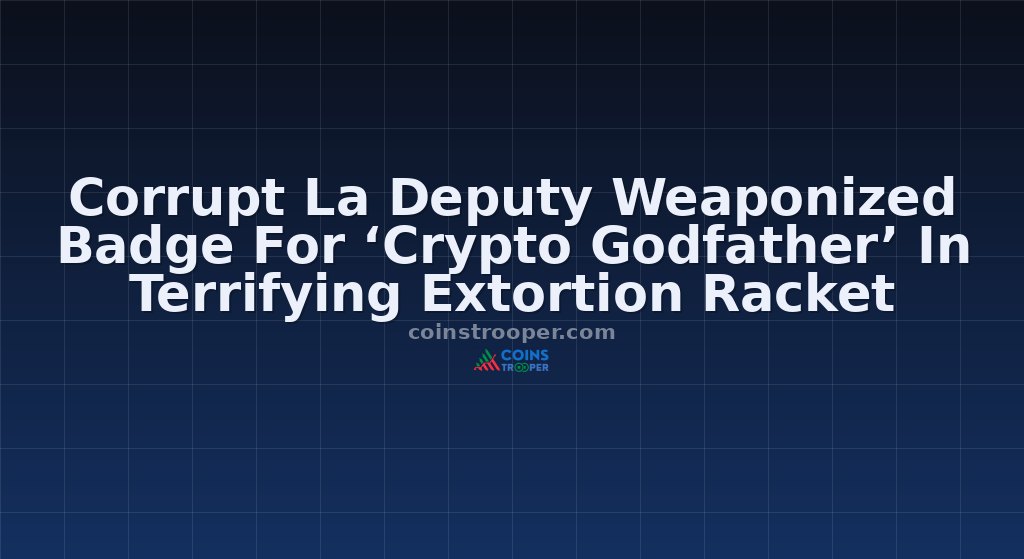Corrupt La Deputy Weaponized Badge For ‘Crypto Godfather’ In Terrifying Extortion Racket

- According to court filings, Coberg was paid at least $20,000 per month by Iza to act as more than just security.
- The two discussed launching a steroid business together and worked hand in hand to intimidate rivals.
- Their tactics allegedly included threats, extortion, and even a staged drug arrest intended to frame one of Iza’s competitors.
- The case shows how criminals in the crypto space have sometimes sought legitimacy or muscle through ties with law enforcement.
What Happened
According to court filings, Coberg was paid at least $20,000 per month by Iza to act as more than just security. The two discussed launching a steroid business together and worked hand in hand to intimidate rivals.
The next morning, the ordeal escalated. At a private shooting range, Iza reportedly held the victim at gunpoint while making further financial demands. L.A.’s business partner ultimately sent more money to secure his release, according to investigators.
Iza, the so-called “Godfather” behind the schemes, remains in federal custody and is awaiting sentencing on December 15. The FBI and IRS Criminal Investigation are leading the case with support from the Los Angeles County Sheriff’s Department.
In August 2024, the SEC charged brothers Jonathan and Tanner Adam with a $60 million Ponzi scheme, accusing them of luring more than 80 investors with a fake crypto trading bot. The bot promised 13.5% monthly returns between January 2023 and June 2024.
A month later, a U.S. federal court ordered New York resident William Koo Ichioka to pay more than $36 million in restitution and penalties for running a fraudulent cryptocurrency and forex investment scheme. His scheme promised unrealistic returns, after a case brought by the Commodity Futures Trading Commission (CFTC).
Market Context
A former Los Angeles County Sheriff’s Department deputy has admitted to abusing his badge and authority to aid a cryptocurrency promoter in extortion and fraud schemes.
Michael David Coberg, 44, of Eastvale, pleaded guilty on Tuesday to federal conspiracy charges after prosecutors detailed how he conspired with 25-year-old Adam Iza, a self-styled Beverly Hills “Godfather” known for running crypto scams.
Why It Matters
Their tactics allegedly included threats, extortion, and even a staged drug arrest intended to frame one of Iza’s competitors.
The case shows how criminals in the crypto space have sometimes sought legitimacy or muscle through ties with law enforcement. For Coberg, it meant leveraging his status as both a sheriff’s deputy and a helicopter pilot to bolster Iza’s schemes.
Details
Authorities say Coberg’s guilty plea brings him closer to sentencing, though details of potential prison time have not yet been finalized. Iza, meanwhile, continues to face multiple fraud and extortion charges connected to his cryptocurrency operations.
Ex-LA Deputy and Crypto Promoter Face Prison in Violent Extortion and Kidnapping Conspiracy
The extent of the conspiracy between former Los Angeles County deputy Michael David Coberg and cryptocurrency promoter Adam Iza became clearer this week as prosecutors revealed disturbing details of the schemes that left victims financially ruined and physically intimidated.
In October 2021, Coberg personally assisted Iza in coercing a victim, identified in filings only as “L.A.,” during a meeting at Iza’s residence.
Prosecutors say Iza staged the encounter by placing firearms on display, while Coberg reinforced the intimidation by identifying himself as an active-duty sheriff’s deputy and questioning the victim. The pressure worked—L.A. transferred $127,000 directly to Iza’s account that day.
Just weeks earlier, Coberg also participated in another elaborate plot targeting a second victim, “R.C.” Court records show the conspirators tricked R.C. into traveling from Miami to Los Angeles using promises of a romantic reunion with his ex-girlfriend.
Once in California, Coberg coordinated with another deputy, Christopher Michael Cadman, to orchestrate a fabricated traffic stop in Paramount.
Deputies allegedly planted narcotics in R.C.’s belongings, resulting in his arrest. Coberg, prosecutors said, drove by the scene as Iza recorded video and photographs of the staged arrest for leverage.
Cadman has already pleaded guilty to related federal charges and is scheduled for sentencing in January 2026. Coberg, who entered guilty pleas to conspiracy to commit extortion and conspiracy against rights, now faces a potential 30-year federal prison sentence when he returns to court on February 17, 2026.
The case has drawn sharp attention to how deeply organized fraud networks can penetrate law enforcement ranks. Federal prosecutors said Coberg’s actions not only betrayed his oath as a deputy but also weaponized the authority of his badge against private citizens in the service of a crypto-fueled criminal enterprise.
Growing Numbers of Fraudulent Crypto Schemes
A week earlier, Montenegrin police arrested Roman Ziemian, co-founder of the alleged $21 million crypto fraud scheme FutureNet, in Podgorica, where he was living under a false identity. Ziemian was wanted in South Korea and Poland on fraud, money laundering, and theft charges.
Institutions and governments, however, have been deploying measures to curb fraudulent schemes. Circle, issuer of the $74 billion USDC stablecoin, is exploring refund options for disputed or fraudulent payments to align blockchain with traditional finance.
Meanwhile, the Reserve Bank of India has mandated dynamic authentication for all domestic digital payments by April 1, 2026. Authority requires at least one unique factor, such as an OTP or biometric, per transaction to curb fraud and extend protections to cross-border card use.
The post Corrupt LA Deputy Weaponized Badge for ‘Crypto Godfather’ in Terrifying Extortion Racket appeared first on Cryptonews.

